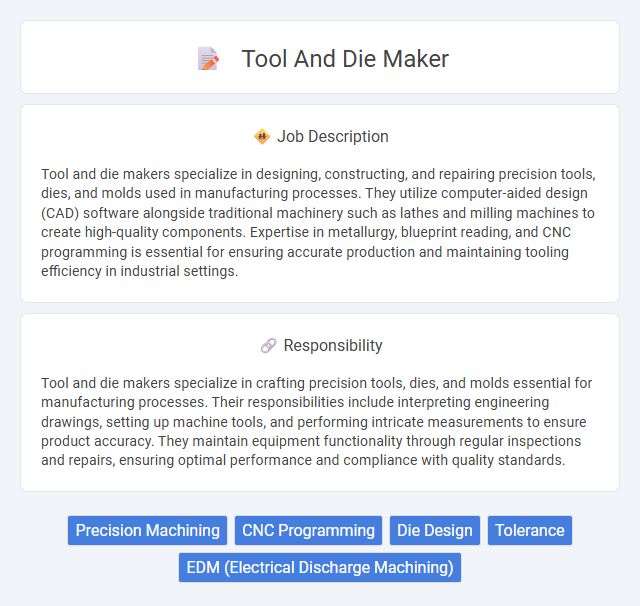
Tool and die makers specialize in designing, constructing, and repairing precision tools, dies, and molds used in manufacturing processes. They utilize computer-aided design (CAD) software alongside traditional machinery such as lathes and milling machines to create high-quality components. Expertise in metallurgy, blueprint reading, and CNC programming is essential for ensuring accurate production and maintaining tooling efficiency in industrial settings.
Individuals with strong attention to detail and mechanical aptitude are likely to find tool and die making a suitable profession. The role often requires precision and patience, which may not be ideal for those who prefer fast-paced or less repetitive tasks. People who enjoy working with their hands and problem-solving in controlled environments probably have a higher chance of thriving in this field.
Qualification
A tool and die maker requires specialized skills in blueprint reading, precision machining, and computer-aided design (CAD) software to create and maintain custom tools, dies, and molds. Typically, an apprenticeship or technical degree in tool and die making or a related trade is essential, combined with hands-on experience in metalworking and manufacturing processes. Proficiency in measuring instruments, welding, and knowledge of materials science significantly enhances job performance and employability in this highly skilled trade.
Responsibility
Tool and die makers specialize in crafting precision tools, dies, and molds essential for manufacturing processes. Their responsibilities include interpreting engineering drawings, setting up machine tools, and performing intricate measurements to ensure product accuracy. They maintain equipment functionality through regular inspections and repairs, ensuring optimal performance and compliance with quality standards.
Benefit
Tool and die makers likely enjoy benefits such as competitive salaries and job stability due to high demand in manufacturing sectors. They probably receive health insurance, retirement plans, and paid time off as part of their employment packages. Opportunities for overtime pay and skill development may further enhance their overall compensation and career growth.
Challenge
Tool and die maker roles likely involve complex problem-solving challenges as they create precision tools for manufacturing. The probability of encountering intricate design modifications may require advanced technical skills and adaptability. These challenges often demand meticulous attention to detail and sustained focus to ensure high-quality production outcomes.
Career Advancement
Tool and die makers with advanced CNC programming skills and expertise in CAD/CAM software often progress into supervisory or manufacturing engineering roles. Gaining certification from organizations like the National Institute for Metalworking Skills (NIMS) enhances promotion opportunities and salary growth. Continuous learning of precision machining techniques and automation technologies is critical for career advancement in this high-demand trade.
Key Terms
Precision Machining
Tool and die makers specialize in precision machining to create custom tools, dies, and molds essential for manufacturing processes. Utilizing advanced CNC machines and CAD/CAM software, they ensure components meet exact specifications and tolerances often within microns. Expertise in materials like hardened steel and carbide enhances durability and performance of fabricated tools, crucial for industries such as automotive and aerospace.
CNC Programming
Tool and die makers specializing in CNC programming design and create precise tools, dies, and molds used in manufacturing processes by writing and optimizing CNC machine codes. Proficiency in CAD/CAM software, along with an in-depth understanding of metallurgy and machining principles, is essential to produce high-quality, accurate components. Mastery of CNC programming enhances efficiency, reduces material waste, and ensures tight tolerances in the production of complex parts used in automotive, aerospace, and industrial sectors.
Die Design
Tool and die makers specializing in die design create precision molds and dies used in manufacturing processes such as stamping, forging, and extrusion. They utilize computer-aided design (CAD) software to develop detailed blueprints that ensure accurate production with minimal waste. Expertise in material properties and machining techniques is essential to produce durable, high-quality dies that meet strict industry standards.
Tolerance
Tool and die makers specialize in fabricating precision tools and dies that require extremely tight tolerances to ensure parts fit and function accurately. Maintaining tolerances within microns is critical to avoid defects and ensure consistent production quality in industries such as automotive and aerospace. Advanced CNC machinery and meticulous measurement techniques are essential for achieving and verifying these exact specifications.
EDM (Electrical Discharge Machining)
Tool and die makers specializing in Electrical Discharge Machining (EDM) use precision equipment to create complex metal parts with tight tolerances for the manufacturing industry. Mastery of EDM technology enables them to cut intricate shapes in hard metals that traditional machining cannot handle, improving efficiency and accuracy. Proficiency in interpreting blueprints and operating CNC EDM machines is essential for producing high-quality dies, molds, and tools.
 kuljobs.com
kuljobs.com